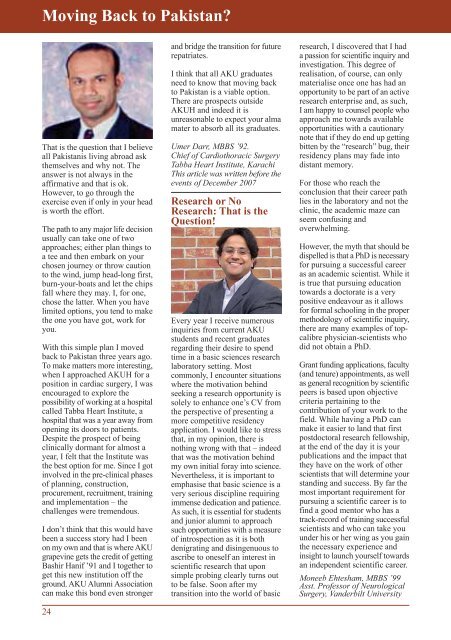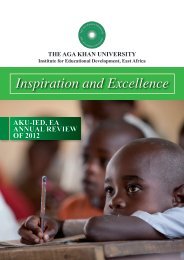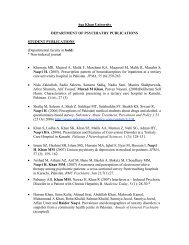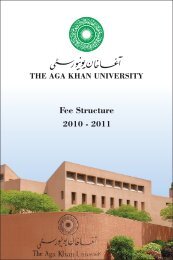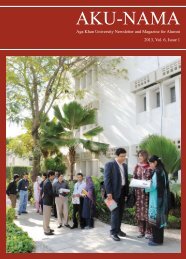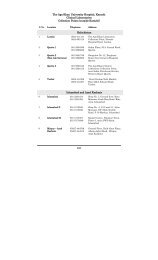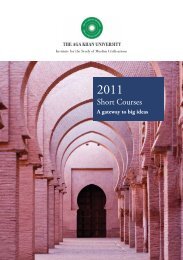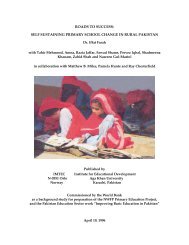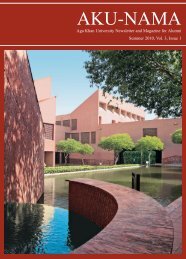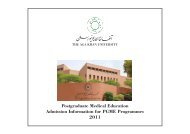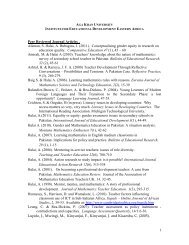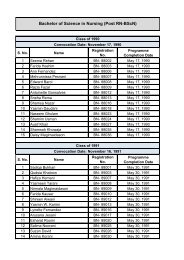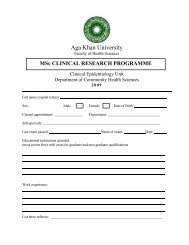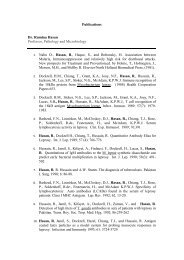AKU-NAMA - Aga Khan University
AKU-NAMA - Aga Khan University
AKU-NAMA - Aga Khan University
- No tags were found...
You also want an ePaper? Increase the reach of your titles
YUMPU automatically turns print PDFs into web optimized ePapers that Google loves.
Moving Back to Pakistan?That is the question that I believeall Pakistanis living abroad askthemselves and why not. Theanswer is not always in theaffirmative and that is ok.However, to go through theexercise even if only in your headis worth the effort.The path to any major life decisionusually can take one of twoapproaches; either plan things toa tee and then embark on yourchosen journey or throw cautionto the wind, jump head-long first,burn-your-boats and let the chipsfall where they may. I, for one,chose the latter. When you havelimited options, you tend to makethe one you have got, work foryou.With this simple plan I movedback to Pakistan three years ago.To make matters more interesting,when I approached <strong>AKU</strong>H for aposition in cardiac surgery, I wasencouraged to explore thepossibility of working at a hospitalcalled Tabba Heart Institute, ahospital that was a year away fromopening its doors to patients.Despite the prospect of beingclinically dormant for almost ayear, I felt that the Institute wasthe best option for me. Since I gotinvolved in the pre-clinical phasesof planning, construction,procurement, recruitment, trainingand implementation – thechallenges were tremendous.I don’t think that this would havebeen a success story had I beenon my own and that is where <strong>AKU</strong>grapevine gets the credit of gettingBashir Hanif ’91 and I together toget this new institution off theground. <strong>AKU</strong> Alumni Associationcan make this bond even stronger24and bridge the transition for futurerepatriates.I think that all <strong>AKU</strong> graduatesneed to know that moving backto Pakistan is a viable option.There are prospects outside<strong>AKU</strong>H and indeed it isunreasonable to expect your almamater to absorb all its graduates.Umer Darr, MBBS ’92.Chief of Cardiothoracic SurgeryTabba Heart Institute, KarachiThis article was written before theevents of December 2007Research or NoResearch: That is theQuestion!Every year I receive numerousinquiries from current <strong>AKU</strong>students and recent graduatesregarding their desire to spendtime in a basic sciences researchlaboratory setting. Mostcommonly, I encounter situationswhere the motivation behindseeking a research opportunity issolely to enhance one’s CV fromthe perspective of presenting amore competitive residencyapplication. I would like to stressthat, in my opinion, there isnothing wrong with that – indeedthat was the motivation behindmy own initial foray into science.Nevertheless, it is important toemphasise that basic science is avery serious discipline requiringimmense dedication and patience.As such, it is essential for studentsand junior alumni to approachsuch opportunities with a measureof introspection as it is bothdenigrating and disingenuous toascribe to oneself an interest inscientific research that uponsimple probing clearly turns outto be false. Soon after mytransition into the world of basicresearch, I discovered that I hada passion for scientific inquiry andinvestigation. This degree ofrealisation, of course, can onlymaterialise once one has had anopportunity to be part of an activeresearch enterprise and, as such,I am happy to counsel people whoapproach me towards availableopportunities with a cautionarynote that if they do end up gettingbitten by the “research” bug, theirresidency plans may fade intodistant memory.For those who reach theconclusion that their career pathlies in the laboratory and not theclinic, the academic maze canseem confusing andoverwhelming.However, the myth that should bedispelled is that a PhD is necessaryfor pursuing a successful careeras an academic scientist. While itis true that pursuing educationtowards a doctorate is a verypositive endeavour as it allowsfor formal schooling in the propermethodology of scientific inquiry,there are many examples of topcalibrephysician-scientists whodid not obtain a PhD.Grant funding applications, faculty(and tenure) appointments, as wellas general recognition by scientificpeers is based upon objectivecriteria pertaining to thecontribution of your work to thefield. While having a PhD canmake it easier to land that firstpostdoctoral research fellowship,at the end of the day it is yourpublications and the impact thatthey have on the work of otherscientists that will determine yourstanding and success. By far themost important requirement forpursuing a scientific career is tofind a good mentor who has atrack-record of training successfulscientists and who can take youunder his or her wing as you gainthe necessary experience andinsight to launch yourself towardsan independent scientific career.Moneeb Ehtesham, MBBS ’99Asst. Professor of NeurologicalSurgery, Vanderbilt <strong>University</strong>


